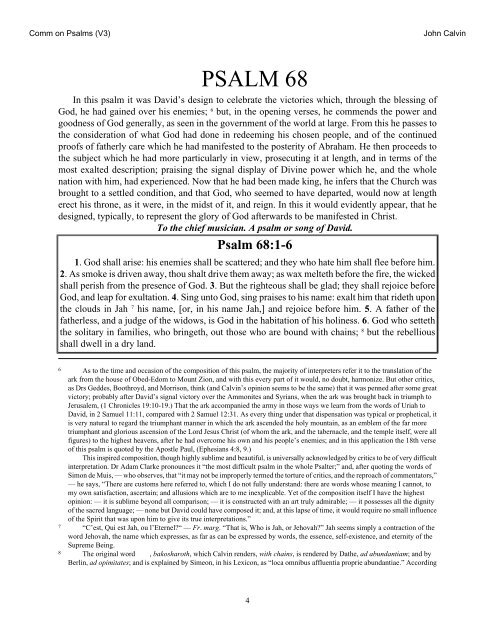Commentary on Psalms - Volume 3 - Bible Study Guides
Commentary on Psalms - Volume 3 - Bible Study Guides
Commentary on Psalms - Volume 3 - Bible Study Guides
- No tags were found...
Create successful ePaper yourself
Turn your PDF publications into a flip-book with our unique Google optimized e-Paper software.
Comm <strong>on</strong> <strong>Psalms</strong> (V3)John CalvinPSALM 68In this psalm it was David’s design to celebrate the victories which, through the blessing ofGod, he had gained over his enemies; 6 but, in the opening verses, he commends the power andgoodness of God generally, as seen in the government of the world at large. From this he passes tothe c<strong>on</strong>siderati<strong>on</strong> of what God had d<strong>on</strong>e in redeeming his chosen people, and of the c<strong>on</strong>tinuedproofs of fatherly care which he had manifested to the posterity of Abraham. He then proceeds tothe subject which he had more particularly in view, prosecuting it at length, and in terms of themost exalted descripti<strong>on</strong>; praising the signal display of Divine power which he, and the wholenati<strong>on</strong> with him, had experienced. Now that he had been made king, he infers that the Church wasbrought to a settled c<strong>on</strong>diti<strong>on</strong>, and that God, who seemed to have departed, would now at lengtherect his thr<strong>on</strong>e, as it were, in the midst of it, and reign. In this it would evidently appear, that hedesigned, typically, to represent the glory of God afterwards to be manifested in Christ.To the chief musician. A psalm or s<strong>on</strong>g of David.Psalm 68:1-61. God shall arise: his enemies shall be scattered; and they who hate him shall flee before him.2. As smoke is driven away, thou shalt drive them away; as wax melteth before the fire, the wickedshall perish from the presence of God. 3. But the righteous shall be glad; they shall rejoice beforeGod, and leap for exultati<strong>on</strong>. 4. Sing unto God, sing praises to his name: exalt him that rideth up<strong>on</strong>the clouds in Jah 7 his name, [or, in his name Jah,] and rejoice before him. 5. A father of thefatherless, and a judge of the widows, is God in the habitati<strong>on</strong> of his holiness. 6. God who setteththe solitary in families, who bringeth, out those who are bound with chains; 8 but the rebelliousshall dwell in a dry land.6 As to the time and occasi<strong>on</strong> of the compositi<strong>on</strong> of this psalm, the majority of interpreters refer it to the translati<strong>on</strong> of theark from the house of Obed-Edom to Mount Zi<strong>on</strong>, and with this every part of it would, no doubt, harm<strong>on</strong>ize. But other critics,as Drs Geddes, Boothroyd, and Morris<strong>on</strong>, think (and Calvin’s opini<strong>on</strong> seems to be the same) that it was penned after some greatvictory; probably after David’s signal victory over the Amm<strong>on</strong>ites and Syrians, when the ark was brought back in triumph toJerusalem, (1 Chr<strong>on</strong>icles 19:10-19.) That the ark accompanied the army in those ways we learn from the words of Uriah toDavid, in 2 Samuel 11:11, compared with 2 Samuel 12:31. As every thing under that dispensati<strong>on</strong> was typical or prophetical, itis very natural to regard the triumphant manner in which the ark ascended the holy mountain, as an emblem of the far moretriumphant and glorious ascensi<strong>on</strong> of the Lord Jesus Christ (of whom the ark, and the tabernacle, and the temple itself, were allfigures) to the highest heavens, after he had overcome his own and his people’s enemies; and in this applicati<strong>on</strong> the 18th verseof this psalm is quoted by the Apostle Paul, (Ephesians 4:8, 9.)This inspired compositi<strong>on</strong>, though highly sublime and beautiful, is universally acknowledged by critics to be of very difficultinterpretati<strong>on</strong>. Dr Adam Clarke pr<strong>on</strong>ounces it “the most difficult psalm in the whole Psalter;” and, after quoting the words ofSim<strong>on</strong> de Muis, — who observes, that “it may not be improperly termed the torture of critics, and the reproach of commentators,”— he says, “There are customs here referred to, which I do not fully understand: there are words whose meaning I cannot, tomy own satisfacti<strong>on</strong>, ascertain; and allusi<strong>on</strong>s which are to me inexplicable. Yet of the compositi<strong>on</strong> itself I have the highestopini<strong>on</strong>: — it is sublime bey<strong>on</strong>d all comparis<strong>on</strong>; — it is c<strong>on</strong>structed with an art truly admirable; — it possesses all the dignityof the sacred language; — n<strong>on</strong>e but David could have composed it; and, at this lapse of time, it would require no small influenceof the Spirit that was up<strong>on</strong> him to give its true interpretati<strong>on</strong>s.”7 “C’est, Qui est Jah, ou l’Eternel?“ — Fr. marg. “That is, Who is Jah, or Jehovah?” Jah seems simply a c<strong>on</strong>tracti<strong>on</strong> of theword Jehovah, the name which expresses, as far as can be expressed by words, the essence, self-existence, and eternity of theSupreme Being.8 The original word , bakosharoth, which Calvin renders, with chains, is rendered by Dathe, ad abundantiam; and byBerlin, ad opimitates; and is explained by Sime<strong>on</strong>, in his Lexic<strong>on</strong>, as “loca omnibus affluentia proprie abundantiae.” According4
















